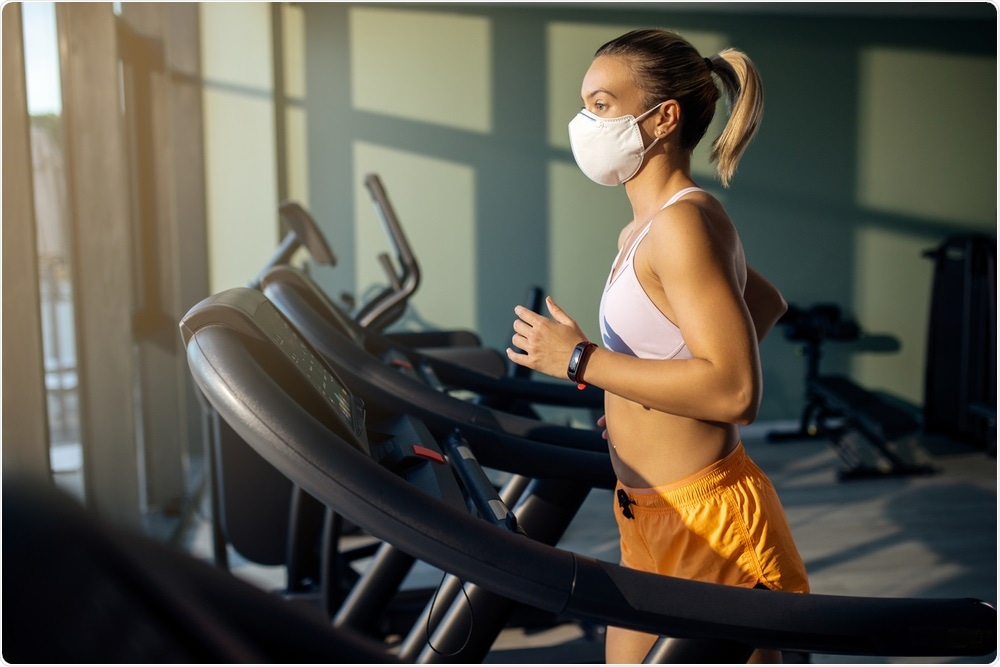During a series of exercise stress testing trials, a new study demonstrates that wearing an N95 respirator or cloth mask does not limit the capacity to conduct physical exercise among adults.

Woman wearing a mask and exercising. Image Credit: Drazen Zigic/Shutterstock.com
No significant differences in physical exertion due to mask-wearing during exercise
Facial masks are being worn in countries around the world due to the ongoing coronavirus disease 2019 (COVID-19) pandemic. Health organizations and governments have advised healthy adults to wear masks throughout daily living activities to reduce the risk of transmission of SARS-CoV-2 responsible for the pandemic.
Wearing masks daily has rapidly become common practice for many people yet clinical research has yet to examine whether this may affect the capacity to conduct routine or physical activities.
A new research letter published in the journal of Nutrition, Obesity, and Exercise, now demonstrates that mask-wearing did not affect the capacity to conduct physical exercise in any way. The study was led by Matthew Kampert who collaborated with colleagues from the Center of Sports Medicine at the Cleveland Clinic in Ohio.
To determine whether mask-wearing interfered with physical exercise, 20 healthy adults were used in a series of cross-randomized trials where individuals ran on a treadmill till peak exhaustion. Men and women were both represented and participants were non-smoker and relatively active individuals.
During exercise, participants underwent a random number of trials with either a cloth mask, an N95 respirator mask, or had no mask whatsoever, each chosen in random order. The volume of oxygen consumed, heart rate, and other physiological measures, were taken at peak activity to compare across treatments.
Immediately following the trial, individuals then answered a series of questions both verbal and written on the comfort, irritability, and discomfort of the masks to assess whether there were any differences in the overall response of the subject to each mask.
Using a series of statistical tests based on univariate analysis of variance (ANOVA), findings showed no differences across treatments, both in terms of physical exertion capacity as well as mask-wearing response.
Despite limited safety concerns, additional research could examine the effects of mask-wearing further
None of the clinical trials were affected by concerns despite pushing participants to peak exercise capacity. As such, the authors conclude that this preliminary study demonstrates that mask-wearing may not affect physical exertion in healthy adults.
However, the authors do acknowledge that more data could be collected on the gas exchange capacity and ventilation rate during the exercise itself, as the data in this study was collected immediately after achieving peak performance.
Additional research could also include a broader range of individuals including participants that may be affected by respiratory issues or possess health-related issues that may be exacerbated by mask-wearing during exercise. Investigating the effects of mask-wearing could also be extended to older as well as younger individuals, which could be affected differently in comparison to the healthy and active participants in this study.
Importantly, clinical research on the effects of preventative measures implemented during the COVID-19 pandemic, such as mask-wearing, is required to assess the short and long-term social, physical, and mental, impacts that may be affecting populations globally.
Journal reference:
- Kampert M, Singh T, Sahoo D, Han X, Van Iterson EH. Effects of Wearing an N95 Respirator or Cloth Mask Among Adults at Peak Exercise: A Randomized Crossover Trial. JAMA Netw Open. 2021;4(6):e2115219. doi:10.1001/jamanetworkopen.2021.15219